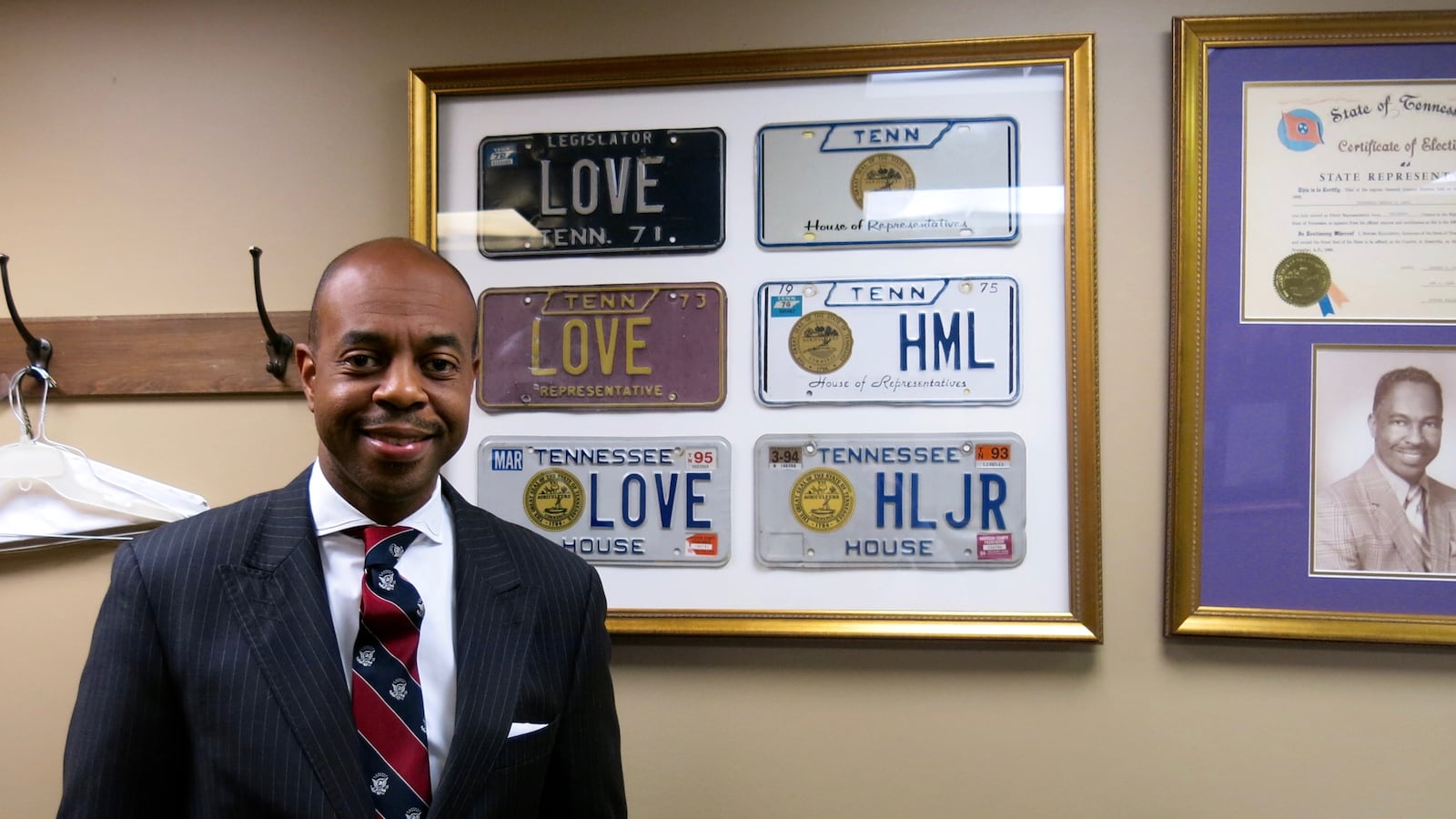Rep. Harold Love Jr. inherited his passion for public education from his parents.
His mother ran a program to increase college access. His father, Harold Love Sr., represented Tennessee’s 54th district in Nashville from 1968 to 1994.
As a middle school student, he used to do his homework in Nashville’s Legislative Plaza while his father was in committee meetings. “We’d discuss what he did,” he said. “That’s why this work … is really part of me.”
Today, the Nashville Democrat represents Tennessee’s 58th district, which rings central Nashville. His office is a stone’s throw from his father’s old office, and his constituents reach him at his dad’s former phone number.
A member of House education committees since his election in 2012, Love says his family is a living testimony to the value of public schools. He and his four sisters are all graduates of Tennessee State University. His niece Christiane Buggs is a school board member in Nashville.
“I’ve got to push for public education,” says Love, 44, who is also pastor of an African Methodist Episcopal church. “It’s what pushed my father out of poverty. He was born in Nashville in 1919. Being African-American in Nashville was not easy. There was no indoor plumbing. But there was public education.
“Education can change your trajectory. Money comes and goes, but education transforms you,” he said.
Chalkbeat sat down with Rep. Love to talk about his late father, why he visits so many schools, and what’s on the horizon for this legislative session.
What’s your experience with Tennessee schools?
First off, I’m the product of Nashville public schools, having gone to kindergarten through high school here. I graduated from White’s Creek High School.
My mother, for 47 years, was the director of (Upward Bound), a program designed to increase the achievement of high school and middle school students. … She was particularly targeting first-generation, lower income students. So I was always exposed to conversations about the need for increased funding.
When I ran for office, education became the cornerstone of my campaign, primarily because I realized that I had greatly benefitted from growing up in a house without distractions that other children had to endure. Both parents were employed full-time. My sisters went to college. Both parents had master’s degrees. So college was not a question of if, but where. … Education was at the forefront of my campaign because I saw the achievement growing between the children in my neighborhood and children in other neighborhoods. By virtue of having a legislative district with seven colleges, I felt that it was important to, as best I could, make the connection between K-12 and higher education, and expose kids to the possibility of going to college, and making it a real thing and not just some fantasy.
How do you prepare yourself to make decisions on education policy?
(When I was elected), I realized it would be for me a good move to visit some actual schools, to sit down with principals and teachers and listen to some of their concerns before I started writing up bills that would affect their lives. … In Nashville, there are 153 public schools. There are 10 members of the legislature from Nashville. On average, everyone should have 15 schools. I have 25. I would hope and wish that every member of the education committee would visit public schools to not make a critique … but to see what is being doing right, to see the possibilities and potential for growth and success.
First, I ask how (each bill) affects my constituents and my students, and then the next question is, will it benefit the person who is carrying the bill? You have to consider folks outside of your district. A good number of the controversial bills oftentimes just deal with Memphis and Nashville, but it’s a balance.
Where do you get your ideas for legislation?
One bill I passed last year allows high school students to take computer science and computer programming as one of the electives required for high school graduation. Before my bill passed, you could take a class on computer basics like how to keyboard, where the mouse is, but not about coding and programming and computer-aided design. (That) bill came from a meeting at the White House. The president’s officer of intergovernmental affairs was pushing this initiative called “Computer Science for All,” and he asked a couple of us from the state level to run bills for computer science. I thought, this makes sense, and had it drafted.
Sometimes they come from constituents, from ideas I’ve had with teachers, students and parents. Sometimes, though not often, I’ll have a wonderful epiphany. I’ll ask, what’s going on, and how can we fix it.
What’s on the horizon for education this session?
This might not seem education-related, but it is. I have a bill to eliminate solitary confinement for persons in juvenile detention facilities. If you don’t put a juvenile into solitary confinement, they may be able to be released from the juvenile system feeling less alienation from their peers … so when they get back into the education system, they’re less belligerent.
And vouchers will come up again. [Love has consistently opposed voucher legislation.] I have a new committee assignment; I’m on finance, ways and means. Vouchers will come to that committee because it has a fiscal note. That will be different because it’s not just education folks. I’ll have to feel my way through how they deal with it, and ask lawmakers why they feel this bill is merited at this time. If nothing else, it helps draw attention to the need for folks to pay attention to what’s being voted on and what effect it will have, not just on your constituents, but the constituents of your colleagues.

